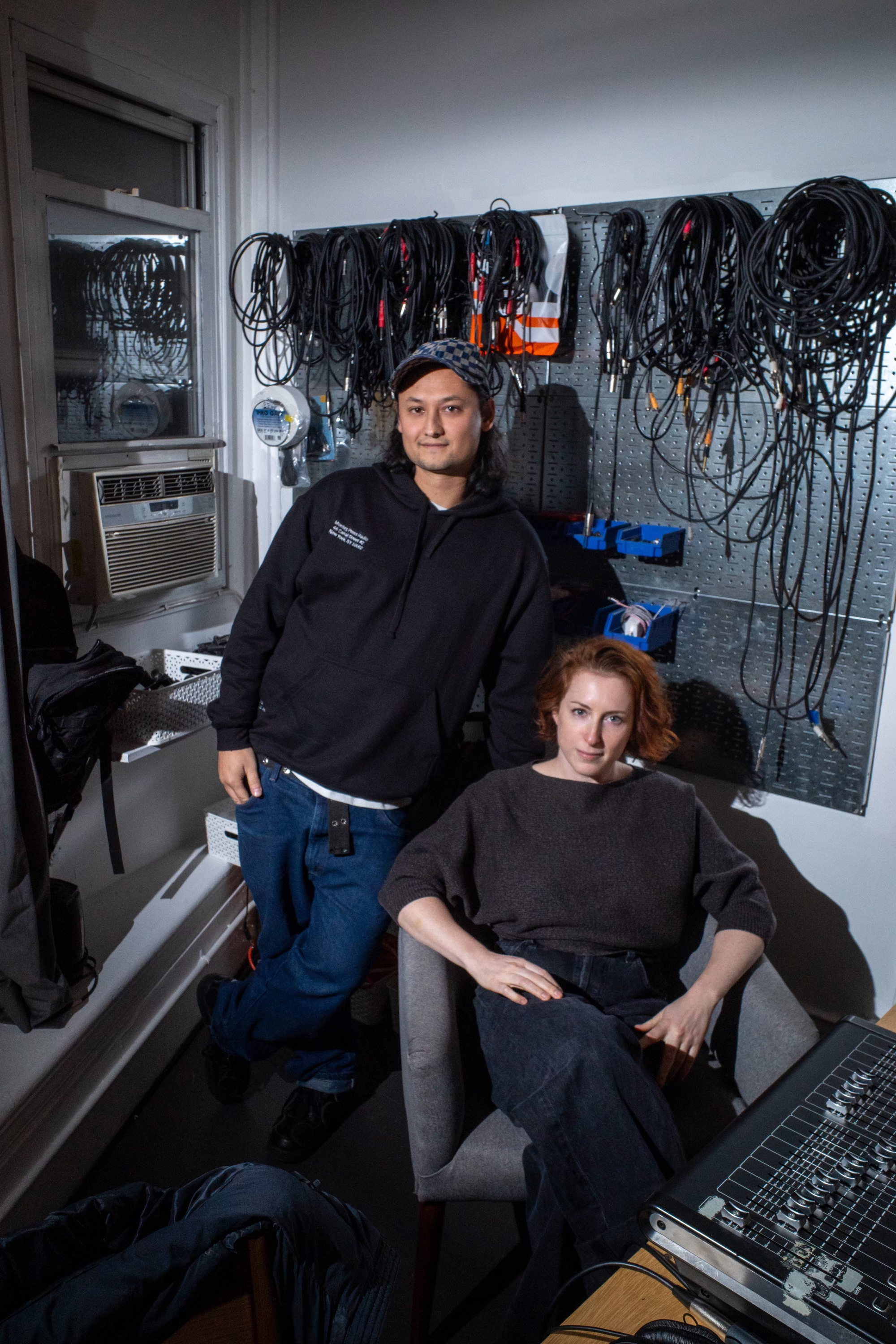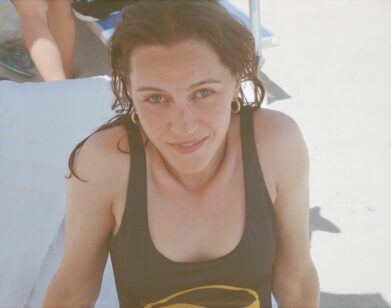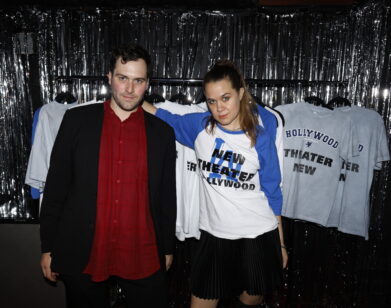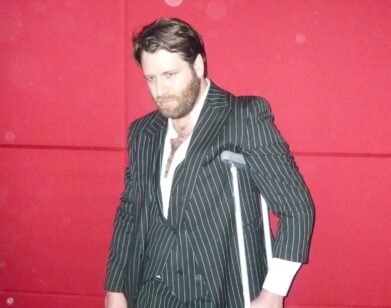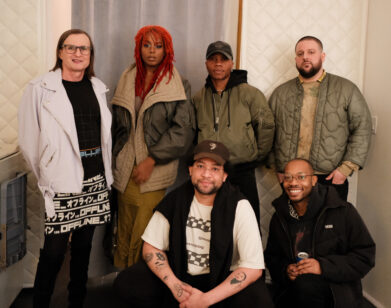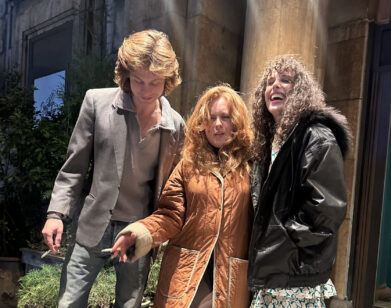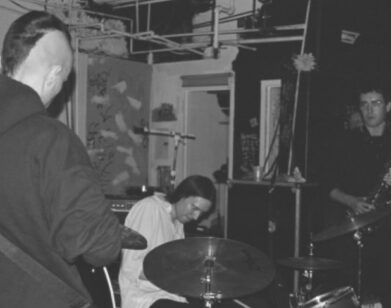ON AIR
How Montez Press Radio Is Making Community Radio Fun Again
Visit radio.montezpress.com, hit play, and you might catch the second act of a radio play. A panel discussion on the art of translation. A lecture on Palestinian liberation. An experimental reading featuring poetry and sound art. The first time I tuned in, the lo-fi DIY of it all reminded me of the community radio station where I got started as an audio producer—a place that defied zeitgeist, branding, or any sense of a coherent vibe. I loved it.
When Montez Press Radio started streaming in 2018, it was intended to be a five-week program of 24/7 audio. Five years later, founder-directors Stacy Skolnik and Tom Laprade are still gently helming the control booth. “It’s very anti-algorithmic,” Laprade says. The idea is that anyone can tap in—and everyone, from musicians and playwrights to designers and activists, seems to want to. “This sense of interdisciplinary conviviality has emerged,” adds Skolnik. While AI-generated playlists, hyperspecific chat shows, and samey true crime podcasts dominate the audio landscape, MPR insists there is another way: the glory and the chaos of community radio.
When I visited Laprade and Skolnik at MPR’s Canal Street studio this fall, the three of us sat down at a table outfitted with studio microphones, which we shoved out of the way. After we toasted to five years on the airwaves, they dished on the power of audio to democratize art spaces, the madness of building a radio station from scratch, and their dreams for the future of MPR.
———
TOM LAPRADE: So you have some experience with community radio?
RACHEL YANG: Community radio is how I got into audio in the first place. Community audio-based projects are so exciting to me, especially because audio is becoming this kind of samey, commercial-sounding thing.
STACY SKOLNIK: Yeah, we started Montez Press Radio in 2018, about a year before COVID, and it was really good that we had established our community in person. It does seem like there’s a lot more audio-based content now than there was before.
LAPRADE: In 2018, podcasts were definitely ascending, and especially since COVID, everyone and their mother has a podcast. I’ve even seen more and more radio projects all over the world. It seems like every city has an art radio thing and every other book fair wants to have some little radio project, but at the time that we were doing it, I don’t think there was that much.
YANG: Did you have a mood board?
LAPRADE: Yeah, it was all post-its, remember? That’s how we got to the graphic design.
SKOLNIK: There was a big, gridded schedule.
LAPRADE: Then our graphic designers, Julian Mader and Max Prediger, saw it and were like, “I have an idea.”
SKOLNIK: They were like, “You’re going to be needing to make a lot of these. What’s something that we can do quickly, easily?”
LAPRADE: They also foresaw how everyone would be sharing it on Instagram. So the square post-it lent itself pretty well already. It has a library card feel to it too. At the time, Berlin Community Radio was the standard of what artist-centered community radio could be, but that ended right as we were starting. Before us in New York, there was Know Wave.
YANG: First of all, happy anniversary.
SKOLNIK: Oh, thanks.
LAPRADE: I was surprised. We just reread your email and I looked at Stacy like, “Is it five years? Oh shit, I guess it is.”
YANG: Congratulations. It feels like a transition from the youth of an arts organization to adult.
SKOLNIK: It emerged as a temporary project. There was a gallery across the street called Mathew and every summer, Montez Press would do a residency there. In the third year, the gallery has moved to our current space, and along with Montez Press co-founder and the third co-founder of MPR, Anna Clark, we started Montez Press Radio. It was supposed to be five weeks, but then it turned into five years. Our Mexico programming is new this year, and we have a day of programming from London curated by Emily Pope and Manda Shutler. The goal is to create what we’ve created here, but elsewhere, and that definitely came to fruition this year.
LAPRADE: Hyper-locality, globally.
SKOLNIK: Exactly. The cities change and we change with it.
LAPRADE: We just reflect the changes.
YANG: What kind of things were you initially programming with?
LAPRADE: We just started with shit we were into. It wasn’t any more profound than that. Stacy’s really into literary stuff. I’m into art world stuff. It was radio, so we had to have some music. So we just started with this wall of post-it notes where we wrote down names. We told ourselves we would do everything live and that no one was allowed to send in pre-recorded stuff.
SKOLNIK: Unless they were far away.
LAPRADE: That remained the case for basically the next year. Then COVID happened and people were like, “Wait, radio actually functions in the real world and unites people sonically in the ether.” Everyone had a canceled lecture, a canceled show, a canceled DJ set, and was suddenly hitting us up like, “Can I do it on the radio?” And then all their friends were tuning in at the same time. That’s when things really started rolling for us.
SKOLNIK: It’s probably the opposite effect that COVID had on every other arts organization because we realized it can actually be a sustainable project.
LAPRADE: I was just thinking about the Ruby [McCollister]’s performance on the fire escape. It was that awkward phase when we were trying to figure out if we’re going to start doing live stuff again. She had a regular show where she did this satire of a radio preacher. We couldn’t do anything inside, but we said, “Maybe we can do something on the fire escape,” because all the restaurants had outdoor dining. There were chairs all the way down, and Ruby was like, “Great, I’ve got a captive audience.” So she went out there with a backup band on the different levels of the fire escapes. It looked like Rent or something. She was just yelling at people to atone for their sins and doing her standup. It was so good.
YANG: Do either of you have a radio or audio background?
SKOLNIK: Absolutely not.
LAPRADE: It’s insane how little we know. I don’t know what any of those buttons do. I know what five of them do.
YANG: So you’re more a poet.
SKOLNIK: Yeah, I’m actually coming out with a novel in June 2024 [with Montez Press]. Tom has an art degree and is more visually inclined.
LAPRADE: For me, one of my favorite things about art was not necessarily the art, but the conversations around it. The conversations you have at the gallery or after watching a film are just as fun.
YANG: You’re describing a very generative space and I feel like that’s what live audio is. You tune into any community radio station, people are messing up, there’s dead air, people are swearing accidentally and it’s raining FCC violations. It can be messy and that’s okay.
SKOLNIK: We don’t have an antenna currently. Well, we do, but we’re not plugged in. We were never legally on the air, and now we operate mostly through our online stream. I think there aren’t that many platforms that I’m aware of that allow for this kind of immediacy.
LAPRADE: One of the reasons this really hit with a lot of people in our world was because people were tired of the back-and-forth of the editorial process. It’s also very anti-algorithmic. It’s just us inviting who we like.
LAPRADE: It’s got to be person-to-person. As soon as someone does a good show, you ask them who they’ve been into and hit that person up. Or someone will come here, have a good time, and be like, “My friend would really vibe with you guys.” We’re also always open to being surprised, even if there’s a thing that we don’t totally get, we’ll put it on. Sometimes it might suck, but the cool thing about radio is that no one really cares that much. A lot of stuff we have on here doesn’t really fit anywhere else.
YANG: Like what?
LAPRADE: There’s a lot of experimental lectures and weird hybrid forms of lecture and drama that some DJ made.
SKOLNIK: A fashion brand, A–Company, put on a play, a portion of Anne Carson’s translation of Antigone, to showcase their new line of clothing. We haven’t done a ton of fashion shows on Montez Press Radio for obvious reasons, but part of the performance was that the director would interrupt the performance to direct in real time. It was as much a rehearsal as it was a performance, and all of the clothes had this really deconstructed quality to them. And then the fact that it was on Montez Press Radio was this other layer of deconstruction. Maybe you wouldn’t have known that that’s what they were doing if you were listening to it.
YANG: Yeah, I tuned in. It really had the feeling of listening to something behind the scenes.
LAPRADE: We have Ernie Glam on here. Ernie Glam ran this magazine through the ’80s and ’90s and was one of the club kids back in the day. They came in to give us this great oral history of the post-Reagan era club scene in New York, and we had Jake Sillen, who runs Heaven, the club in Brooklyn. They had this really cool hour-long intergenerational talk and oral history storytelling about these crazy scenes over the decades.
SKOLNIK: I also think of several of our kitchen performances, like Mat Kastella. He performs publicly around the city and around various bus stations and depots around America. We heard him once because he was down on Canal Street.
YANG: Can you think of an iconic live radio mistake that will go down in history of public radio lore?
LAPRADE: There’s a thing that happens every now and then where I’ll invite an artist on and they’ll walk in like, “So you’re going to interview me?” And I’m like, “What? You were supposed to come up with a show.” This one time—I don’t know if I’ll blow her spot.
YANG: We can anonymize it.
LAPRADE: One time this artist came in and that happened, and she’s like, “Whatever, I have this handle of Jack Daniels.” And she just sits here and talks to herself and it’s fucking hilarious. And at some point she was like, “I’m sick of my own voice.” She prank called Marina Abramović. She left a message saying that a UPS package was downstairs. She called a phone sex operator who was like, “What are we doing?” She was like, “Are you sure you don’t want to have phone sex?” And the artist was like, “No, just talk to me.” At some point, the phone sex operator was like, “What do you do?” And then they were like, “I’m an artist.” There was a long sigh and the phone sex operator was like, “Oh.”
SKOLNIK: It was like a reverse therapy session.
LAPRADE: But some people do love the sound of their own voice. They need very little prompting.
SKOLNIK: Over the last five years, I’ve become more comfortable. We really aim to bring people joy. We just added these channels to our website to make things a little bit easier because we found that with so much in the archive, it can be difficult to know where to begin.
LAPRADE: It’s so all over the map, too. Most people just think our website’s broken, but we have this function called the public playlist. It’s a big global jukebox where people can add songs to this playlist, but you can’t listen to what you’ve added until you’ve listened to what other people have added. We wanted to keep it old radio in that you tune in and whatever’s on is on. It’s not on demand. You can add something, but it’s a bit off-demand.
SKOLNIK: I think that people have come to associate Montez Press Radio with the practice of gathering, so when people do a live program with us, there’s also the acknowledgement that there will be people in the room. We like to give people options, various points of access.
LAPRADE: Also, when we started this, we had all kinds of theories about why audio. One of them was visual fatigue. It’s nice to listen to some longform audio content while doing your dishes or zoning out on the couch as opposed to doom scrolling and consuming 50 images in a minute. That’s actually probably very few images for how many you see online.
YANG: The beautiful thing about live radio is you don’t know who could be listening. It’s up to you how you speak to that audience. Who did you think your audience was going to be when you started, and who do you feel like it is now?
SKOLNIK: The contributors were always the primary.
LAPRADE: We got a lot of parents listening.
SKOLNIK: We got parents, for sure.
LAPRADE: We have people from all over the world somewhere on our metrics, which we don’t check.
YANG: What’s the farthest away that you’ve had a segment?
SKOLNIK: We have someone doing the segment on Réunion Island. They’re doing an audio diary of the sounds in Réunion Island. I love segments like that. We were just talking about having a channel for audio collages from these faraway places.
LAPRADE: We had that mushroom collecting segment.
SKOLNIK: It was mushrooming on the outlying islands of Hong Kong. And we had a phone call from Malaysia, Dinawan Island, an oral report of life on an isolated island.
LAPRADE: It’s funny because we have such hyper-specific New York stuff, like the deepest cut of downtown lore. It’s nice to have someone just taking mushrooms on an island off some coast.
YANG: You mentioned that part of your ethos in the beginning was that you didn’t want to be poaching artists from other organizations.
SKOLNIK: I wouldn’t say poaching necessarily, we just felt like there was a false sense of competition between arts organizations and that’s where this sense of interdisciplinary conviviality has emerged.
YANG: Do you feel like Montez Press Radio is trying to democratize the art space and get past that sense of competition?
LAPRADE: It’s happening more and more where some organization will be doing a lecture series or something and they realize that it’ll be a lot more accessible if they do it in partnership with us.
YANG: What’s next?
LAPRADE: We’re going to reassess all our regular shows and maybe make a new roster where we’re a little more deliberate about covering different disciplines.
SKOLNIK: Another thing I think is working closely with certain artists on projects. Tom and I occupy a weird position where we don’t represent artists or writers, but we often do—
LAPRADE: Grow with the artists that we’ve been supporting. We’ll also be doing a residency with Canal Projects, this great new gallery. This one will be more research-based. We just want to keep on rocking until the wheels fall off.
SKOLNIK: Yeah, I think that can be our five-year plan.
YANG: That’s live radio, baby.

